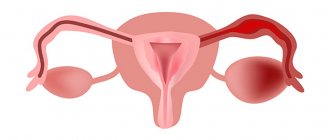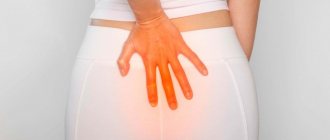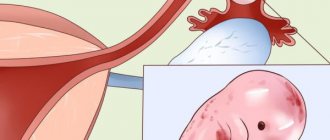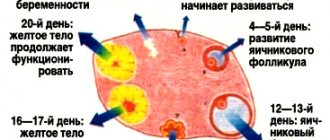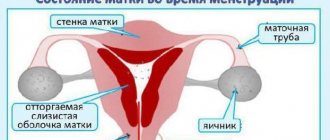Ladies are already accustomed to experiencing not only inconvenience every month, but also feeling unwell throughout the entire period of PMS. There may be a sensation of pain in the lumbar region, as well as in the pelvic organs and even in the gastrointestinal tract. The slightest deviation from the norm in the gynecological or endocrine sphere creates an imbalance in the functioning of hormones, which is the main reason why the stomach hurts before and during menstruation.
The nature of the pain during such a period can be: pulling, aching. The pain also varies in duration and intensity. In the presence of gastritis or peptic ulcer, the nature of the pain becomes acute and sharp in the stomach.
There is no need to be afraid; slight pain in the abdominal area some time before the onset of menstruation is considered normal.
Can your stomach hurt before your period?
When a woman's body goes through puberty, all changes are accompanied by slight fluctuations in hormones. These surges are especially noticeable with the onset of menstruation. Due to individual characteristics and physiology, the stomach may hurt before menstruation.
Pain on the eve of menstruation is also accompanied by the following symptoms:
- dizziness;
- weakness;
- nausea and possible vomiting;
- anxiety;
- apathy.
A prerequisite for stomach pain before menstruation may be excessive contractions of the uterus and increased sensitivity to them. Although some women associate discomfort with eating certain foods the day before. Irritation of the intestines by foods intolerable to the body can cause a response from the gastrointestinal tract. You should stop eating this type of food while expecting your period - it is better to give preference to fresh vegetables and fruits.
Advice! If you have intestinal disorders, you should not overload your stomach: you should drink more clean water and eat low-fat, moderately salty foods.
You can learn more about the reasons why your stomach hurts during menstruation from the video:
Pain factors
Why does my stomach hurt during menstruation? There are several reasons for this painful condition. They are presented below:
- Increased levels of prostaglandins. Due to this, 70% of women feel discomfort in the stomach. Slight pain manifests itself as a spasm in the abdominal area. Pain may appear in the lumbar region.
- Increased sensitivity to certain foods during menstruation. During such a period, food intolerance manifests itself to a greater extent. They irritate the walls of the stomach and intestines, leading to illness and nausea, and possibly vomiting.
- Pathologies of the genital organs, incorrect location of the uterus. The stomach hurts not only because of the distorted location of the uterus, but also because of the inflammatory processes taking place in it. Pain may occur in the upper and lower abdomen.
- Hormonal disbalance. An imbalance of hormones in a woman’s body can affect the appearance of stomach pain. An overactive thyroid gland also has a negative effect.
- Sensitivity of the whole body to uterine contractions. Rhythmic contractions of the uterus provoke discomfort in the stomach. Each person has a different pain threshold, so pain symptoms may vary.
- Increased susceptibility to stimulation of the nervous system. Stress, psycho-emotional breakdowns, and hard work weaken the nervous system and lead to pain in the stomach area.
- Diseases of the gastrointestinal tract. During menstruation, gastrointestinal pathologies may worsen due to a weakened immune system. Gastritis, gastric ulcers and other pathologies contribute to increased abdominal pain.
- Various types of tumors. With cancer, it’s not just the stomach that hurts. Nausea, vomiting, or bloody diarrhea may occur. If the disease is diagnosed, strict adherence to all instructions of the attending physician is required.
- Binge eating. A common reason why the stomach hurts during menstrual periods. Overeating threatens hormonal imbalance due to thyroxine deficiency. In the future, this leads to infertility. To prevent overeating, you need to independently control the amount of food you eat.
- Alcohol abuse. Stomach pain during menstruation from drinking alcoholic beverages. Ethyl alcohol contained in drinks is considered a toxin for the human body. Once in the stomach, it destroys the walls of the digestive organ and blocks the production of the necessary substance - mucin. A lack of mucin leads not only to pain in the stomach, but also to vomiting after eating, general malaise, and lethargy. A person does not receive all the necessary microelements and vitamins. And their insufficient quantity leads further to pain during menstruation.
- Food poisoning. It occurs when various microorganisms enter the human body: bacteria, viruses, protozoa. When poisoned, the entire gastrointestinal tract hurts. Nausea, vomiting, diarrhea, and high fever appear. During the menstrual cycle, poisoning is especially severe. You cannot endure pain with unpleasant symptoms; you must seek the help of a doctor.
A medical specialist can figure out why your stomach hurts during menstruation. After conducting tests and various studies, he can determine the exact diagnosis and prescribe the appropriate treatment.
Brief characteristics of the menstrual cycle
It is so conceived by nature that it is the woman who continues the family line. To do this, her body goes through a cycle, during which the egg is prepared for fertilization and further gestation of the fetus occurs. Each woman's menstrual cycle has its own time frame and it depends on her individual characteristics. On average, it lasts from twenty-five to thirty-five days, which is considered the norm. The end of one cycle and the beginning of the next is determined by menstruation. That is, when an egg ready for fertilization has not been fertilized, it, together with the endometrium (a special inner layer of the uterus that is formed for bearing a fetus), is excreted along with blood through the vagina - this is menstruation, which occurs monthly in every woman of reproductive age. It is at this time, and also a few days before it, that the hormonal levels in the body change, physiological changes also occur, which naturally affects:
- emotional state, ladies may experience nervousness, apathy, irritation;
- feeling of well-being, dizziness, nausea, and painful sensations appear.
Naturally, this condition is not very pleasant, so every representative of the fair sex is looking for any opportunity to get rid of pain and improve her condition.
Why do hormones affect the stomach?
Estrogen and progesterone are two hormones that regulate your menstrual cycle. Prostaglandins are a lipid or fat, a compound that actually acts as a hormone. There are different types of prostaglandins, one of them is specific to the female reproductive system. Like estrogen and progesterone, prostaglandin levels also fluctuate throughout the menstrual cycle.
It is not known exactly why the intestines hurt before menstruation and how this is related to hormonal changes throughout the cycle. However, it is known that sex hormone receptors are located along the gastrointestinal tract. Receptors interact with hormones and regulate certain physical responses.
Fluctuations in estrogen, progesterone, and prostaglandins during the menstrual cycle also cause changes in the muscles of the gastrointestinal tract that control digestion.
The presence of sex hormone receptors in the gastrointestinal tract causes pain in the stomach, intestines and digestive problems during menstruation.
- Progesterone is well known to cause constipation during pregnancy by slowing the movement or contraction of muscles in the gastrointestinal tract.
- On the other hand, estrogen tends to increase gastrointestinal motility and may cause diarrhea.
Prostaglandins, specific to the female reproductive system, play a role in the contraction of the uterine muscles, which can cause pelvic cramps. Because there are also sex hormone receptors along the gastrointestinal tract, as in the uterus, prostaglandins can potentially act on muscles in the gastrointestinal system. This may be why your stomach hurts before your period and you experience bloating.
Reasons why your stomach hurts before your period
Stomach pain that varies in duration and intensity during and before menstruation can be identified with premenstrual syndrome. It is also accompanied by breast swelling, pain in the nipples, lower back discomfort and intestinal disorders. If pain in the chest and lower abdomen is considered normal, then discomfort in the stomach on the eve of menstruation occurs for the following reasons:
- Non-standard location of the uterus. In some women, the uterus is located unconventionally, so it can put pressure on nerve fibers, causing a condition where the stomach hurts.
- Physiology of the body. Individual physiological characteristics, for example, the location of nerve endings in the abdominal cavity, can also cause discomfort.
- Inflammatory process of the reproductive system. In women with no history of gynecological diseases, this symptom will not occur. But with inflammation, the discomfort that foreshadows menstruation can radiate to the stomach.
A common cause is adolescence of young girls. When the menstrual cycle is established, a hormonal imbalance occurs, causing stomach pain. Secondary dysmenorrhea is another cause of stomach pain. In this case, it becomes regular and occurs with uterine tone. During this period, the woman does not want to eat, apathy and fatigue appear.
Why does the lower abdomen hurt during menstruation?
According to research, doctors have found that at this time more than 80% of women suffer from severe pain in the lower abdomen. This is explained by the fact that during such a period substances that are responsible for inflammation and pain accumulate in the body in large quantities.
They increase the ability of the uterus to contract, and spasms are formed that disrupt blood circulation and lead to local irritation of the nerve endings. Thus, pain appears, which lasts only the first days, or throughout the entire menstruation.
There are other reasons why pain occurs:
- Features of the location of the uterus and pressure on nerve receptors.
- Low level of sensitivity to pain.
- Hormonal background.
- Increased pain after 30 years.
- High levels of the hormone estrogen.
- Ongoing inflammatory processes.
- Consequences of injuries or operations.
- An IUD installed to protect against pregnancy can cause pain during menstruation.
In medical terms, the pain can be explained by the hormone prostaglandin causing uterine contractions.
The greater its concentration, the more it contracts, causing discomfort. Plus this adds a feeling of nausea, headache or even vomiting.
Cycle disruption also leads to pain before and during menstruation. At a young age, when the cycle is just beginning to form, many suffer from painful sensations. When complaining, the doctor may prescribe a course of examinations.
After which, a diagnosis called algodismenorrhea is most often established. Its symptoms are abdominal pain extending to the upper legs, sleep disturbances or sweating. Some people stop having menstrual pain after their first birth.
If menstrual pain is simply unbearable, then its causes may be:
- cyst on the ovaries;
- endometriosis;
- lack of calcium in the blood;
- bend of the uterus;
- inflammation in the pelvic organs;
- miscarriage.
It is impossible to independently determine what the cause is. To determine the root cause of painful periods, you should consult a doctor.
Exacerbation of intestinal diseases
Menstruation often complicates fissures in the anus. Wounds that come into contact with blood-stained pads or menstrual discharge are subject to additional irritation and infection. Frequent washing of the intimate area and the use of tampons are required.
Symptoms of hemorrhoids:
- feeling of feces “stuck” in the anus;
- itching, heaviness in the anal passage;
- pain, bleeding during bowel movements.
Such signs appear against the background of an increased flow of blood to the organs and tissues in the small pelvis, which automatically fills the hemorrhoids and causes swelling of the mucous membranes. Cold therapy (ice suppositories, compresses) is excluded from the course of treatment during menstruation, so as not to cause intestinal inflammation.
After menstruation, the acute sensations subside, returning the course of the pathology to a chronic form.
A microcrack or scratch may form in the anus, caused by solid fecal matter. Tissues are also damaged if the mucous membrane is not sufficiently moistened by the secretion of the glands.
Symptoms of anal fissure:
- sharp pain when the rectum is cleared of feces;
- discomfort during defecation;
- slight bleeding from the anus;
- red streaks in stool.
Such symptoms also occur in other diseases. You should go for an examination to a proctologist to rule out colitis or cancer.
Pain in the intestines not associated with menstruation
Before the arrival of menstruation, blood flows abundantly to the internal organs. One and a half to two weeks before “day X”, that same belly, unloved by all women, appears, which cannot be gotten rid of. This is preparation for a possible pregnancy. A large influx of blood, like a litmus test, reveals all the “problem areas”:
- inflammation or infection in the genital organs (there may be no symptoms, discomfort appears only when the problem spreads to neighboring organs);
- exacerbation of hemorrhoids (blood circulation worsens, stagnation occurs, pressure on the rectum increases);
- problems with the nervous system;
- diseases of the endocrine system.
Do I need to take pills?
To get rid of pain caused by uterine contractions, it is allowed to take antispasmodics. This is a group of painkillers whose action is based on weakening spasms of smooth muscle fibers and blood vessels (when used systemically, the spasm stops completely). The most popular medicine in this group is No-shpa
"(analogue - " Drotaverine
"). To eliminate pain during menstruation, it can be taken in tablets (1 tablet 2-3 times a day) or given intramuscular injections. For severe pain, it is best to use the injection form of the drug, and after stopping the acute attack, switch to oral administration.
Another well-known and affordable antispasmodic is “ Papaverine
" It is best used in rectal suppositories. The daily dosage is 1-2 suppositories, the course of use should not exceed 3-5 days. If the pain does not stop after the end of your period, you should consult a doctor. “Papaverine” helps to quickly alleviate a woman’s condition and restore her ability to work, but it will not be possible to get rid of unpleasant sensations completely in one day.
If your stomach hurts very much during menstruation, you can use combination drugs with anti-inflammatory, antispasmodic, and analgesic effects. These include complex preparations “ Spazmalgon
" and " Pentalgin
" To relieve moderate pain, a one-time dose of non-steroidal drugs with anti-inflammatory action is allowed. It can be:
- "Ibufen";
- "Moment";
- "Ibuprofen";
- "Nurofen Express";
- "Next".
Important!
The exact dosage of any drug is indicated in the instructions. It is not advisable to use medications with antispasmodic and analgesic effects for more than 3 days in a row without consulting a doctor. Some, such as ibuprofen-based products, can cause severe side effects if taken long-term, so they should only be used to relieve acute pain.
General recommendations
Any gynecologist will tell you exactly whether your stomach can hurt during menstruation and give general recommendations for dealing with discomfort. Following the rules will significantly reduce the risk of pain. A woman should:
- Shortly before the start of menstruation, reduce physical activity. It is recommended to temporarily abandon grueling workouts. They enhance cardiac activity. Blood flow accelerates and, as a result, pain occurs.
A cold compress can help reduce pain
- Apply a cold compress if you experience abdominal discomfort during your period. The procedure should not be repeated too often.
- Take the pain medication recommended by your doctor.
- Get examined at a medical facility if the pain is accompanied by other unpleasant symptoms.
The gynecologist can refer the girl to other doctors. This is possible if there is a suspicion of diseases and serious abnormalities.
If you have other symptoms, your doctor may prescribe a comprehensive examination and tests.
Diagnosis and treatment of pain
If your stomach hurts when your period is late, you should check for pregnancy. To do this, you need to make an appointment with a gynecologist. The doctor will prescribe a hCG test and also perform an ultrasound, which allows you to diagnose pregnancy in the early stages. If there is no delay in menstruation, but the pain varies in intensity, the following diagnosis is performed:
- take hormone tests;
- a consultation is made with a gastroenterologist;
- it is necessary to consult a neurologist;
- It is recommended to contact a gynecologist to prescribe medications if the problem does not lie in gastrointestinal disorders.
Treatment is carried out according to the established cause of stomach pain before menstruation. If it occurs due to gastrointestinal pathologies, appropriate treatment with various drugs is prescribed. In case of pathology or inflammation of the genital organs, the doctor may prescribe hormonal medications, as well as a variety of procedures.
Attention! The neurologist will prescribe the patient a sedative that has a relaxing effect on the body so that the pain is easier to bear.
Additional examinations
During menstruation, most women experience stomach pain. If you have an unpleasant symptom, you should visit a gynecologist. He will conduct a diagnosis and, if necessary, give a referral to other doctors. You will need to visit an endocrinologist if you have complaints about:
- sleep disturbance;
- causeless weight loss;
- prostration.
Pain during menstruation, accompanied by the listed symptoms, indicates increased activity of the thyroid gland. The pathology provokes the manifestation of irritability and tearfulness. The psychological state worsens. Pathology is diagnosed using ultrasound.
It is important to eliminate the risk of gastrointestinal diseases. The main diagnostic method is endoscopy.
Endoscopy is often prescribed to identify possible gastrointestinal problems.
A patient with gastrointestinal disorders complains of:
- nausea;
- weakness;
- dizziness;
- diarrhea;
- lack of appetite.
The listed signs, accompanied by pain in the abdomen, cause discomfort, so an examination is carried out immediately.
Why does my stomach hurt during menstruation? This video will tell you about it:
Inflammation of the appendages
Inflammation of the appendages is of an infectious-inflammatory nature. The body becomes hypothermic and picks up a sexually transmitted infection.
As with endometriosis, this disease during exacerbation is manifested by intense pain, concentrated on the right and left.
It can be aching, pulling, sometimes acute, it is a “harbinger” of menstruation, and often goes away the next day. Other symptoms resemble endometriosis and cystitis.
The discharge is either large or scanty. The diagnosis is made after undergoing an examination. Treatment is prescribed in the form of antibacterial therapy. Suppositories are also recommended for local treatment.
Prevention
To reduce pain in the stomach before menstruation, it is recommended to take a number of preventive measures. One of the main conditions is not to exhaust the body with excessive physical activity and stress. It is necessary to perform special breathing exercises daily to help you survive the pain.
Prevention of pain before menstruation includes the following actions:
- giving up alcohol and nicotine;
- spending a long time in the fresh air;
- consumption of complexes of vitamins and minerals;
- increase in the number of positive emotions;
- normalization of diet;
- increasing fluid intake - at least 30 ml per 1 kg of body weight per day;
- conducting morning exercises.
When the stomach hurts severely, it is recommended to apply a warm heating pad to the lumbar area, as well as use painkillers. Dietary nutrition for premenstrual syndrome includes the consumption of fresh vegetables, fruits, and rosehip decoction.
Advice! To reduce pain, you can stroke your stomach clockwise with gentle circular movements.
Why do women experience menstrual pain?
Although a feeling of heaviness and bloating in the lower abdomen before the onset and in the first days of menstruation is a physiological norm, few people are happy about it. We'll explain why your belly swells during your period and provide some effective tips that will help you avoid feeling the onset of your period, at least around your waist, and alleviate common PMS symptoms. The end and beginning of menstruation cause many physiological changes in a woman’s body, including noticeable bloating and gas - unpleasant from an aesthetic point of view, because it affects the contours of your figure. It is estimated that approximately 70 percent of women feel like their belly is noticeably enlarged and heavier every month just before their next period begins. The reason is fluctuations in estrogen levels and a sharp decrease in progesterone levels on the eve of each new menstrual cycle. The feeling of bloating in the lower abdomen in women is one of the common manifestations of the well-known premenstrual syndrome PMS, which significantly worsens the lives of many women of fertile age for several days. The good news is that during the first two to three days of your menstrual cycle, your ovaries will begin to produce adequate amounts of hormones again.
A set of exercises against pain
In order to relieve discomfort during menstruation, a special set of exercises was developed that helps relieve pain:
- The woman should lie on her back and raise her legs up (the angle should be at least 90 degrees). Your feet should rest firmly against the wall. This position cannot be changed within 5 minutes. After this, you can move on to another exercise.
- At this stage you need to lean on your knees and elbows. The head should be in a lowered position. You must stand in this position for at least 3 minutes.
- You should lie on your stomach and rest your hands on the floor. In this case, you need to raise your head and chest. The head should be laid back. This exercise must be performed at least three times.
- At this stage you should lie on your back. The feet rest on the floor, the legs bend at the knees, the lower back lifts off the floor. After this, you need to take the original position. This exercise must be performed at least 4 times.
Nutritional Features
Nutrition has a great influence on the human body. Often, due to an incorrect diet, the stomach hurts before and during menstruation. It is advisable to follow the recommendations regularly, and not just on the eve of menstruation.
A woman should exclude from her daily diet:
- foods high in fat;
- fried food;
- foods high in salt and sugar;
- alcohol;
- caffeinated drinks;
- soda;
- sauces;
- unnatural seasonings.
It is recommended to completely abstain from alcohol
It is recommended to consume foods that have been previously boiled or steamed. To get rid of monthly pain, a woman needs to give up bad habits and follow a diet.
It is important to adhere to the water regime. Drinking herbal and fruit teas is allowed. The daily water requirement is 2-3 liters. Drinking coffee is strictly prohibited. It contains components that increase pain. Five meals a day are recommended.
Nutrition should be balanced. A woman should give preference to products with a lot of vitamins. Dishes should be chosen that are low-fat. The amount of flour is reduced.
During the visit, the doctor may recommend a mixture for preparing a healing drink.
Various herbal teas are very beneficial
How to reduce period pain
There is no one universal method that will relieve all women from regular pain.
It simply cannot be, since this happens differently for everyone. Pain can be a harbinger of the onset of menstruation and last the first days, or cause discomfort until it ends.
Each person must, through selection, find their own way, if not to completely get rid of them, then at least to reduce these sensations.
You can reduce pain by observing the following points:
- Find time to relax. It is necessary to take breaks and days off while working, to ensure that the body is not overloaded.
- Set aside time for sleep, it’s better to go to bed at the same time.
- Create a daily routine and follow it. In this case, the nervous system will begin to rest.
- Do not overcool the body. Drafts or clothing that is incorrectly selected for the weather will lead to inflammation that disrupts the cycle.
- Monitor your diet; it should not only be correct, but also balanced (reduce the amount of flour products, fried foods, eliminate alcohol).
- Drink clean water without gas.
- Stop smoking.
- Sign up and attend a gym or yoga class.
- Go to the sauna (reduce stress).
- Spend more time walking.
- Practice hardening.
Intimate gymnastics will help reduce the feeling of pain. When performing Kegel exercises, the muscles of the perineum become stronger, elasticity and tone increase. Thus, blood supply to the reproductive organs improves and the likelihood of inflammatory processes decreases.
A prerequisite before using the technique is a medical consultation, which will identify possible contraindications.



